Research projects
- FRONTIER
- PRECINCT
- RESOLUTE
- WE-TRANSFORM
- My-TRAC
- RIDE2RAIL
- MetroHESS
- MAIANDROS
Project description:
FRONTIER project, funded by the European Program Horizon 2020 (May 2021-April 2024), has focused on the design and development of advanced traffic management systems, with the aim of ensuring high levels of resilience of transport networks in cases of unplanned events and traffic disruptions. The project brought together 19 partners throughout Europe (Universities, transport operators, technology development companies), to support and strengthen the transition to a new era in transport network management, through the development and pilot implementation of innovative traffic management systems facilitating the communication among relevant actors in emergency situations.https://www.frontier-project.eu
Contribution of ELLINIKO METRO S.A. to the project:
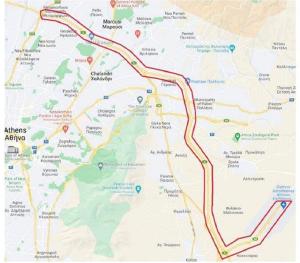 ELLINIKO METRO S.A. has been responsible for the project activity that explored potential factors that can support or hinder the future implementation of innovative traffic management solutions in European cities. For this purpose, the points of view of the competent organisations and authorities were gathered using the focus group methodology, combined with questionnaires. In addition, ELLINIKO METRO participated in the pilot test of the implementation of the innovative FRONTIER traffic management system in Athens. The Athens pilot was implemented along the important multi-modal corridor from/to Athens Airport to/from D. Plakentias Station, which is part of the Athens International Airport-Piraeus Port Metro connection, in collaboration with Attikes Diadromes and OASA. The FRONTIER platform was successfully tested and validated for emergency incidents (e.g. a temporary closure of a metro station or an incident along Attiki Odos Tollway), with the aim of improving cooperation with transport system operators in the area of the incident to take appropriate measures and achieve optimal passenger service.
ELLINIKO METRO S.A. has been responsible for the project activity that explored potential factors that can support or hinder the future implementation of innovative traffic management solutions in European cities. For this purpose, the points of view of the competent organisations and authorities were gathered using the focus group methodology, combined with questionnaires. In addition, ELLINIKO METRO participated in the pilot test of the implementation of the innovative FRONTIER traffic management system in Athens. The Athens pilot was implemented along the important multi-modal corridor from/to Athens Airport to/from D. Plakentias Station, which is part of the Athens International Airport-Piraeus Port Metro connection, in collaboration with Attikes Diadromes and OASA. The FRONTIER platform was successfully tested and validated for emergency incidents (e.g. a temporary closure of a metro station or an incident along Attiki Odos Tollway), with the aim of improving cooperation with transport system operators in the area of the incident to take appropriate measures and achieve optimal passenger service.

Project description:
The European project PRECINCT (Horizon 2020, October 2021-September 2023) connected private and public critical infrastructure actors in a geographical area with the aim of developing a method for managing cyber-physical attacks, which ensures a protected area for citizens and critical infrastructure. The project provided the framework for systematic management of the security and resilience of critical infrastructure, the infrastructure for collective management of multiple facilities, using innovative technologies that were implemented and evaluated in four large-scale Living Labs. https://www.precinct.info/
Contribution of ELLINIKO METRO S.A. to the project:
ELLINIKO METRO SA participated in Living Lab 3 (LL3) which focused on the Athens critical infrastructure (CI) ecosystem and the resilience of the transport system against cyber-physical events. LL3 developed and tested the PRECINCT platform regarding the increasing resilience of CIs (rail and road network along the multi-modal corridor from/to Athens Airport to/from D. Plakentias Station), in the event of various cyber-physical attack scenarios, including a threat of a bomb being placed on the network, as well as a black-out. This corridor is of great importance for the Attica Region as, following the extension of Metro Line 3 to the port of Piraeus, this corridor forms part of the metro connection between Athens Airport and the port of Piraeus, which effectively serves the residents and tourists of the Attica Region.
ELLINIKO METRO S.A. contributed by providing data related to the Metro (e.g. infrastructure, services, passengers, schedule, etc.) and identifying connectivity requirements, in order to create the digital twin of the Metro infrastructure under consideration and actively participated in the modeling of the Metro’s resilience, as well as in the successful testing of the PRECINCT platform in the emergency scenarios examined.
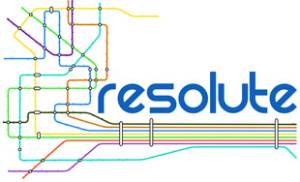
Project description:
Strengthening the resilience of critical transport infrastructure, such as the metro, is considered imperative for two main reasons: these systems provide critical support to every socio-economic activity and are currently one of the most important economic sectors and, secondly, the very networks that transport people, goods and information are the same ones through which risks spread. The European project RESOLUTE, funded by the Horizon 2020 Programme (2015-2018), reviewed the concepts of assessing and managing resilience in transport and developed European Resilience Management Guidelines (ERMG), taking into consideration that resilience does not refer to the performance of individual system elements but mainly to the interactions within and between the system. https://www.resolute-eu.org/
Contribution of ELLINIKO METRO S.A. to the project:
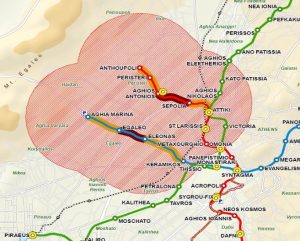 ELLINIKO METRO SA actively contributed to the development of European Guidelines for the Management of the Resilience of critical infrastructures and participated in the pilot testing and evaluation of the tools developed in the project, in Athens. ELLINIKO METRO, in collaboration with the National Technical University of Athens (NTUA), conducted a Stated Preference Survey of Metro Passenger Behavior Management for a bomb planting scenario and contributed to the validation of the Decision Support System in case of evacuation of the site. At the same time, using the EMME-2 Transportation Model, it examined various scenarios for alternative service of Metro passengers by buses in the event of an emergency interruption of Metro operation, finding the optimal solution for passenger service.
ELLINIKO METRO SA actively contributed to the development of European Guidelines for the Management of the Resilience of critical infrastructures and participated in the pilot testing and evaluation of the tools developed in the project, in Athens. ELLINIKO METRO, in collaboration with the National Technical University of Athens (NTUA), conducted a Stated Preference Survey of Metro Passenger Behavior Management for a bomb planting scenario and contributed to the validation of the Decision Support System in case of evacuation of the site. At the same time, using the EMME-2 Transportation Model, it examined various scenarios for alternative service of Metro passengers by buses in the event of an emergency interruption of Metro operation, finding the optimal solution for passenger service.

Project description:
The Horizon 2020-funded European project WE-TRANSFORM (December 2020-March 2024) investigated the impacts of digitalisation and automation on the workforce of the transport sector. The project combined expertise in all aspects of transport as well as available analytical tools and applied a participatory approach to create a common European agenda geared towards addressing the challenges linked to the impacts of automation and digitalisation on the Transport workforce. To do this, the project created a collaborative platform for stakeholders with user-friendly, shareable knowledge on the impacts of automation on Transport sector employment.
Contribution of ELLINIKO METRO S.A. to the project:
ELLINIKO METRO SA was one of the 34 cooperating Transport sector bodies (e.g. International Union of Railways (UIC), POLIS network, Italian Railways, HITACHI RAIL, Hellenic Train, MERCEDES-BENZ AG, Universities and research institutions, etc.) and participated in interviews, thematic workshops and focus groups, to identify and analyze the impacts of automation and digitalization on the Transport workforce. In this context, ELLINIKO METRO S.A. conducted a relevant survey among its employees and recorded their opinions on the impact of automation and digitization on their work, while actively participating in the project workshops to develop the EU strategy and policies to minimize the expected impacts and to train human resources in new advanced technologies (https://wetransform-project.eu/ )
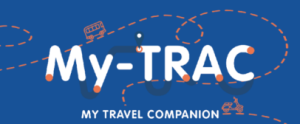
Project description:
The Horizon 2020-funded My-TRAC project (Grant Agreement 777640, 2017-2020) developed an innovative mobile application, which acts as a companion to the user during travel and learns from the user’s profile and travel habits to suggest appropriate personalized travel alternatives, especially in cases of emergency, aiming at seamless travel. My-TRAC application promotes an unprecedented participation of users before, during and after a trip, through an intelligent human-machine interface and numerous functionalities such as crowdsourcing, group suggestions, data sharing.
The application uses a wide range of technologies, such as emotional computing, artificial intelligence and user choice simulation, which merge expertise from many sectors. Finally, through My-TRAC platform for public transport operators, also developed in the project, the connection and integration of services from various fixed-track transport operators and other public transport providers is facilitated, helping to achieve seamless mobility and the MaaS (Mobility-as-a-Service) approach. Pilot tests of the application were carried out in Barcelona, Madrid, the Netherlands and Athens (http://www.my-trac.eu/ )
Contribution of ELLINIKO METRO S.A. to the project:
 ELLINIKO METRO SA successfully coordinated the pilot test of My-TRAC application for users and public transport operators in Athens. In addition, ELLINIKO METRO helped with gathering the feedback from all the pilot tests of the application, organizing focus groups with users of the mobile application, as well as with public Transport service providers, with the aim of identifying ways to improve both the mobile application and the platform for public transport operators. At the same time, ELLINIKO METRO SA also assisted in recruiting users who were asked to evaluate the “environment” and the format of the application in relation to ease of use.
ELLINIKO METRO SA successfully coordinated the pilot test of My-TRAC application for users and public transport operators in Athens. In addition, ELLINIKO METRO helped with gathering the feedback from all the pilot tests of the application, organizing focus groups with users of the mobile application, as well as with public Transport service providers, with the aim of identifying ways to improve both the mobile application and the platform for public transport operators. At the same time, ELLINIKO METRO SA also assisted in recruiting users who were asked to evaluate the “environment” and the format of the application in relation to ease of use.
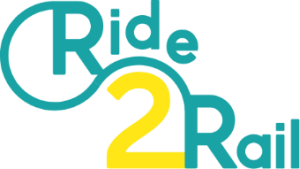
Project description:
The RIDE2RAIL project, funded by the European Program Horizon 2020 (December 2019 – April 2023), developed an innovative mobile app and related tools to promote and enhance the use of carpooling in combination with the Metro, to minimize traffic congestion and air pollution. The project integrated data from various sources: public, private and social networks and existing Transport platforms. The app users can compare and choose among multiple modes of transport based on travel time, comfort, cost and environmental impacts. Pilot tests of the app were carried out in four European cities: Padua, Athens, Brno and Helsinki. https://ride2rail.eu/
Contribution of ELLINIKO METRO S.A. to the project:
ELLINIKO METRO S.A. participated, in collaboration with CERTH, in the pilot test of the application in Athens. ELLINIKO METRO planned and coordinated the conduct of a stated preference survey for the combination of carpooling and Metro in Athens. The aim of the survey was to investigate the willingness of Metro passengers to use carpooling as an access/egress mode. This survey was carried out at the D. Plakentias and Koropi Metro stations, on a sample of more than 400 passengers who mainly use private cars or buses to get to the Metro and was also used to find approximately 150 Metro passengers willing to participate in the pilot test of the application.

Project description:
The MetroHESS research project (2018-2021) was implemented within the framework of the National Action “Bilateral and Multilateral R&T Cooperation Greece – Germany” and the Greek actions were co-financed by the European Regional Development Fund (ERDF) and national resources through the Operational Programme (O.P.) Competitiveness, Entrepreneurship & Innovation (EPAnEK). The project developed a Hybrid Energy Storage System from the regenerative braking of Metro trains in supercapacitors and batteries, which uses the energy to cover auxiliary loads of electromechanical systems such as Lighting Systems, Escalators, Elevators and other basic loads. Until now, this amount of energy remains unused and is released as heat to the environment. The ultimate objective of the project is the implementation of the Hybrid Energy Storage System on a larger scale in the Transport sector. The Greek partners participating in the project were ELLINIKO METRO SA and CRES, while the German partners were the Institute for Electrical Energy Systems of the University of Hannover (Leibniz Universität Hannover) and the company Stercom Power Solutions GmbH. The metro operating company, Fixed (Rail) Transport SA (STA.SY), also participated in the implementation of the project. https://metrohess-project.eu/
Contribution of ELLINIKO METRO SA to the project:
For the purposes of the project, measurements of braking energy in trains and energy consumption in substations were carried out at Sepolia and Peristeri stations and the system design was successfully tested with the construction of a small-scale prototype. The results of the measurements show significant potential for storing and reusing the energy which is lost during the braking of trains. It is estimated that the MetroHESS system is so efficient that 90% of the energy consumption of the electrical systems of the stations can be covered with the reused energy from the braking of trains, provided that its installation is carried out as designed.
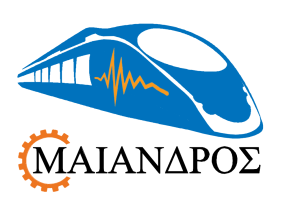
Project description:
The MAIANDROS project (2018-2022) was implemented within the framework of the RESEARCH – CREATE – INNOVATE Action and was co-financed by the European Union and national funds through the Operational Programme (OP) Competitiveness, Entrepreneurship & Innovation (EPAnEK). The project refers to the automatic monitoring of the proper functioning of mechanical subsystems and components of rolling stock, more precisely the suspensions, lateral stability systems, rotating components, as well as rails and bodies of railway vehicles under normal operating conditions. The automatic collection of data was carried out using sensors (accelerometers, etc.), on-board computers and advanced signal analysis of stochastic oscillation. The automatic collection of data/measurements was carried out on a Series III train in operation by STA.SY. The train was equipped with the appropriate data acquisition/measurement equipment. The ultimate objective is to organize predictive maintenance based on the condition of a system (Condition Based Maintenance), which is expected to lead to significant cost savings. Specifically, the scope of the project includes the following: (i) Self-diagnosis of early failures, (ii) estimation of the remaining useful life of critical components and (iii) early detection of any reduction in the lateral stability margin of the vehicles.
Participation of ELLINIKO METRO S.A. in the project:
The project was carried out in collaboration with the University of Patras (project coordinator). ELLINIKO METRO S.A. participated in all project activities and more specifically in the organization of data/measurement collection, as well as in the investigation of the business case for changing the existing and increasingly costly Preventive Maintenance model to Condition Based Maintenance. Within the framework of MAIANDROS project, a Patent was obtained for the innovative method of Condition-Based Maintenance of trains, entitled “Diagnostic unit for suspensions, wheels and tracks of railway vehicles by measuring oscillation signals from the operating vehicle” (Patent Number 20220100321/1010518)

